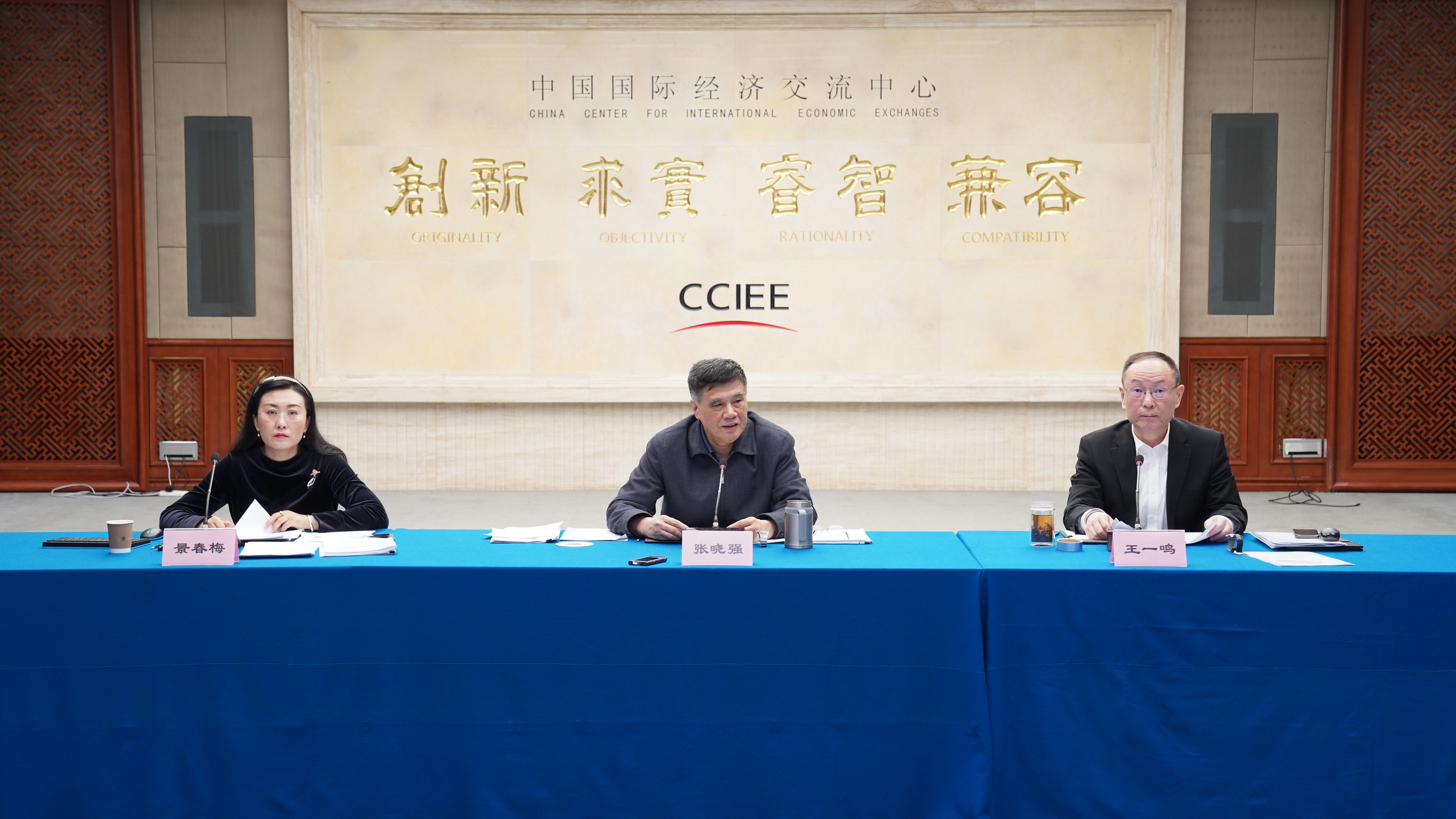Policy Analysis on Carbon Peaking and Carbon Neutrality-CCIEE Hosts the 146th “Monthly Economic Talk”
- Time:2021-12-09
- source:CCIEE
On 30 November 2021, China Center for International Economic Exchanges (CCIEE) organized the 146th “Monthly Economic Talk” through virtual approach. With the theme of “carbon peaking and carbon neutrality”, the Talk was chaired by Wang Yiming, Vice Chairman and Chairman of Academic Committee of CCIEE, and Zhang Xiaoqiang, Executive Vice Chairman and CEO of CCIEE, Li Zheng (attending online), Executive Vice President of Institute of Climate Change and Sustainable Development of Tsinghua University, and Jing Chunmei, Head of Information Department and Director and Research Fellow of Institute of Energy Policy Research, delivered speeches respectively.

Zhang Xiaoqiang pointed out that, the top-level policy design introduced in October 2021 to achieve carbon peaking and carbon neutrality (dual carbon) targets and the evolving “1+N” policy system by Chinese central government mark a new stage of China’s dual-carbon affairs. According to the guidance of the policy, the focus of adjustment would be laid on industrial structure and promotion of low-carbon transformation of transport. China will proactively advance digitalization, facilitate in-depth integration of digital economy and real economy, improve industrial energy efficiency, and realize green, low-carbon and sustainable development. Besides, China will push forward the low-carbon development of transport system, increase percentage of electricity in energy consumption, and promote new-energy vehicles. China will also continue to optimize transport structure, improve infrastructure of multimodal transport, innovate organization of combined transport, and work on technology breakthroughs constantly. He stressed that dual-carbon targets can be achieved during the process of advancing high-quality economic growth by better preparation for the worst case, in an orderly and stable manner, and with secure measures that are by no means abrupt, overnight and campaign-like.
Wang Yiming held that the reasons behind the shortage of energy supply recently were complicated, including not only a selling price that is lower than the buying and campaign-like carbon reduction actions under administrative measures, but also the mindset of some local governments that they wish to fulfill the task of controlling intensity and total volume of energy consumption without shouldering responsibilities of any mistake. To better achieve the dual-carbon targets, Chinese government should improve tax, investment and financing and price policies encouraging green and low-carbon transformation, giving a better play to the role of the market and forming an effective incentive system. Local governments should improve their ability of refined administration, push forward adjustment of industrial structure based on local conditions, and secure a smooth transition from de-capacity to accomplishment of dual-carbon targets. More efforts should be taken to transform traditional industries to low-carbon ones as the proportion of renewable energy in total consumption should be increased. It should be secured that industries with high energy consumption can weed out the market in a meticulous and orderly manner through acquisition and merge, avoiding bankrupt and clearing as much as possible and extraordinary debt burden.
Li Zheng viewed that addressing global climate change has become a global consensus. China has defined dual-carbon targets as one of the general strategies for national development, and consequently carried out top-level design and macro policies. Compared with western countries, it is a formidable task for China to achieve carbon reduction targets as the time span to realizing carbon neutrality after carbon peaking is shorter, requiring for more diligent efforts. Although low-carbon transformation asks for tremendous input, China should shoulder its responsibility as a big country, conform to the trend of low-carbon development all around the world, promote transformation of energy and technology systems in a proactive manner, and increase the use of non-fossil energy. China should step up investment in climate sector and carry out matching economic policies, so as to ensure fair transformation of carbon intensive industries, accomplish goals set in Paris Agreement and support China’s high-quality development of economy.
Jing Chunmei indicated that the 14th Five-Year Plan period is a crucial time window to achieve dual-carbon with energy transition as a major initiative. China faces enormous pressures and challenges in energy sector, such as high proportion of coal in energy consumption, more heavy industries than the light, low energy efficiency, insufficient innovation in key energy technology, absence of market-based pricing system and external uncertainties. China should advance the progress of carbon reduction like targeted poverty alleviation. According to the general principles of reducing coal, stabilizing oil, and increasing gas and introducing new energy, it should speed up the adjustment of energy structure, improve energy efficiency in major fields like industry, transport and construction and set up environment-friendly and efficient exploitation and supply mechanisms of fossil energy. The mechanism for coal enterprises to exit the market should be improved and the establishment of “X+1+X” oil and gas market should be accelerated. China should fasten the development of an electricity system that is able to support the development of new energy in massive scale. Besides, more efforts should be taken to improve the energy saving and efficiency for the long run, push forward technological innovation and breakthrough in energy sector, and boost international cooperation on energy under the framework of dual-carbon goals.
After the speeches, experts present at the Talk interacted and communicated with the media. Some research fellows of CCIEE and audience from member organizations of CCIEE, research institutes, enterprises and the media took part in the Talk through virtual approach.
